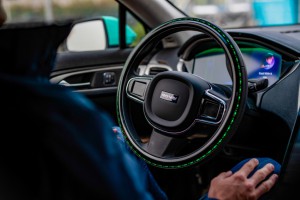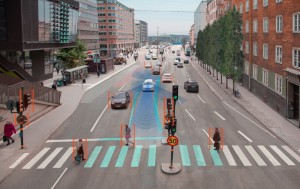
Zenuity, a Volvo Cars joint venture with Veoneer, received approval from the Swedish government to begin autonomous testing on public roads.
A Volvo Cars joint venture has gotten approval to test its software in self-driving cars on Swedish highways at speeds of up to 80 kilometers or 60 miles per hour.
Zenuity, a joint venture between Volvo and Swedish tech company Veoneer, developed software for Level 4 autonomous driving that will be tested in a Volvo car by trained drivers with their hands off the steering wheel. The venture is striving to keep up with rivals in the U.S. and China in the development self-driving vehicles.
Volvo’s self-driving effort was side-swiped last year when one of its sport utility vehicles, which was being used as a test-bed for Uber’s self-driving venture, was involved in an accident that killed an Arizona pedestrian. A post-accident investigation showed that the advanced-driver assistance features on the Volvo test vehicle had been disabled.
In the wake of the accident in Arizona, Uber halted its self-driving program and scaled back its development of self-driving vehicles, which are thought to be the key to potentially lucrative freight and passenger-carrying services.
(Volvo expecting slow ramp up of Charleston plant with Trump tariffs. Click Here for the story.)
Meanwhile, other companies are pushing ahead with tests. General Motors’ Cruise Automation subsidiary is testing self-driving vehicles on the streets of San Francisco, according to Dan Ammann, Cruise Automation’s new CEO. Germany’s BMW and Audi have also secured the permission to test self-driving cars in California.
Last year, the Swedish automaker also has teamed up with Baidu to use the Chinese company’s autonomous software to develop a Level 4 car.
Zenuity has been running tests in Sweden to collect data to develop autonomous functionalities and sensors, while Volvo has been carrying out separate tests to gather data to improve the driver experience and study driver behavior. However, Volvo has postponed plans for a test of self-driving vehicles in its hometown of Gothenburg, Sweden.
Veoneer Chief Technology Officer Nishant Batra said this week the approval to do real-life tests was “essential for gathering important data and test functions. It is a strong proof-point for the progress of Zenuity’s self-driving capabilities,” he said, according to Reuters.
(Click Here for more about Apple cutting 200 jobs related its autonomous vehicle project.)
Veoneer spokesman Thomas Jonsson said it was too early to say when Zenuity could potentially test without a safety driver.
But Tim Cook, CEO of Apple, which has kept an eye on development of self-driving vehicles, has described the task of teaching a vehicle to drive on the open road as the most difficult challenge facing the tech and automobile companies.
Nevertheless, old-line automotive companies such GM, Ford, Mercedes-Benz and Volvo are fearful of being left behind in the race to develop the technology that only a decade ago seemed to be the stuff of science fiction
Volvo and Veoneer created Zenuity in 2017. Zenuity is now expected to have its first driver assistance products on sale this year on vehicles built by Volvo and its Chinese parent Geely.
(To see more about Waymo’s plans to outfit cars with its self-driving tech in MI plant, Click Here.)
Volvo has goals of delivering self-driving cars sometime after 2021 and deriving a third of its sales from fully autonomous cars by 2025. A top Level 5 vehicle, or fully autonomous vehicle, will be able to navigate roads without any driver input in all conditions.

